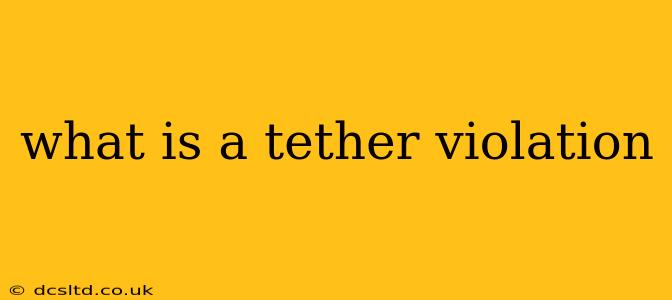A tether violation occurs when someone subject to electronic monitoring, often as a condition of probation, parole, or bail, breaches the terms and conditions of their monitoring device. This seemingly simple act can have significant legal consequences, ranging from increased restrictions to incarceration. This comprehensive guide will delve into the specifics of tether violations, outlining the various types, consequences, and steps to take if facing such accusations.
What is Electronic Monitoring (Tethering)?
Before understanding tether violations, it's crucial to grasp the concept of electronic monitoring itself. Electronic monitoring, or tethering, involves the use of a device—typically an ankle bracelet—that tracks an individual's location. This technology provides law enforcement and/or court officials with real-time data on the individual's whereabouts. It's often used as an alternative to incarceration, allowing individuals to remain in the community while still being supervised.
Types of Tether Violations
Tether violations are not all created equal. They can be broadly categorized into several types:
1. Geographic Violations:
This is perhaps the most common type of violation. It involves the monitored individual leaving a pre-designated geographic area, such as their home or a specified radius around their home, without permission. This could involve a simple trip to the store without prior authorization or a more serious transgression, such as traveling to a prohibited location.
2. Curfew Violations:
Many tether programs include curfew restrictions, requiring the individual to be at a specific location during certain hours. Failing to adhere to these curfew stipulations constitutes a violation.
3. Tampering with the Device:
Attempting to remove, damage, or disable the electronic monitoring device is a serious violation. This includes actions like cutting off the bracelet or attempting to interfere with its GPS signal.
4. Alcohol or Drug Use Violations:
Some tether programs incorporate alcohol or drug testing as part of the monitoring process. Positive results for prohibited substances will constitute a violation.
5. Contact with Prohibited Individuals:
If court orders prohibit contact with specific individuals, contacting them while under electronic monitoring constitutes a violation.
What are the Consequences of a Tether Violation?
The consequences of a tether violation can be severe and depend on several factors, including:
- The severity of the violation: A minor, unintentional infraction might result in a warning, while a serious, deliberate breach could lead to significant penalties.
- The individual's criminal history: Individuals with prior convictions are more likely to face harsher consequences.
- The terms of the court order: The specific conditions of the electronic monitoring program will dictate the potential repercussions.
Possible consequences include:
- Increased monitoring: More frequent check-ins, stricter curfew restrictions, and a smaller permitted geographic area.
- Revocation of probation or parole: This can lead to immediate incarceration.
- Increased bail: If the tether was a condition of bail, the bail might be revoked and the individual incarcerated.
- Additional charges: Depending on the nature of the violation, new criminal charges could be filed.
- Jail time: This is a common consequence for serious tether violations, especially repeat offenders.
What to Do If Accused of a Tether Violation
If you're accused of a tether violation, it's crucial to take immediate action:
- Contact your attorney immediately: An experienced attorney can guide you through the legal process and represent your interests.
- Gather any evidence that might support your defense: This could include receipts, witness statements, or documentation that refutes the violation.
- Be honest and cooperative with your probation or parole officer: While maintaining your rights, honesty can often mitigate the severity of the consequences.
- Do not attempt to tamper with your electronic monitoring device: This will only exacerbate the situation.
Disclaimer: This information is for educational purposes only and is not a substitute for legal advice. If you are facing a tether violation, consult with a qualified legal professional immediately.
Frequently Asked Questions (FAQ)
What happens if my tether battery dies?
While unlikely to be considered a deliberate violation, a dead battery should be reported immediately to your probation or parole officer. Failure to do so could be construed as an attempt to circumvent the monitoring.
Can I leave my house for work while on a tether?
Whether you can leave your house for work depends entirely on the specific conditions of your electronic monitoring agreement. This should be clearly outlined in your court order. Always obtain prior authorization before deviating from your designated geographic area.
How accurate is electronic monitoring technology?
Electronic monitoring technology, while generally reliable, is not perfect. GPS signals can be affected by various factors, and there is always a margin of error. However, this is generally not a strong defense in a violation hearing.
What if the tether malfunctioned?
If you believe your electronic monitoring device malfunctioned, you should report this immediately to your probation or parole officer and provide evidence of the malfunction.
Can a tether violation affect future employment prospects?
While not an automatic barrier to employment, a tether violation and subsequent criminal record can certainly affect future job prospects. Honesty and proactively addressing the issue with potential employers are crucial.
